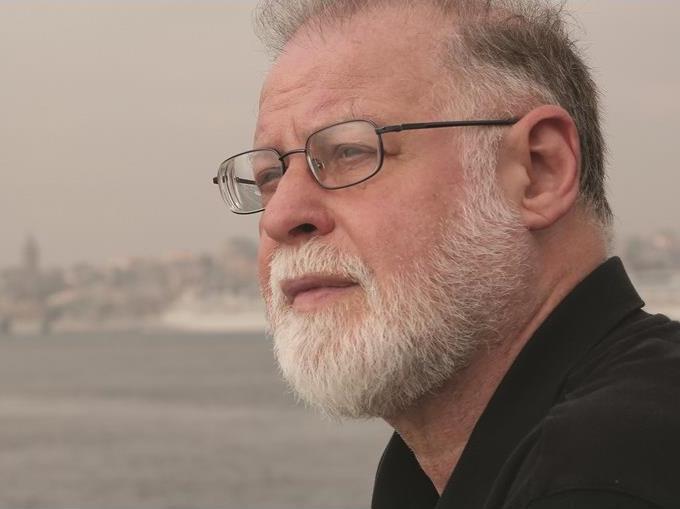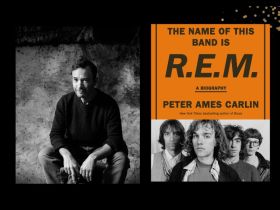Alberto Manguel shares his views on The Art of Reading. Image via Perth Writers Festival 2017.
Another highlight of the Perth Writers Festival 2017 was The Art of Reading. With facilitator William Yeoman, three writers took us on quite a ramble through this rich and rewarding pursuit. With Alberto Manguel (Curiosity, Yale University Press, 2015), Damon Young (Distraction, Rutledge, 2016) and Jane Smiley (Golden Age, Penguin Random House 2015), we visit unexpected places and delight in finding ourselves far from plan and structure, among the greats and the interesting lesser figures of the writing world, all mixed up together. It was a very concentrated and conceptually busy session, but here are just a few of the outstanding moments.
The event kicked off with Yeoman’s question on how the writers came upon reading as a child. It was on seeing a poster one day, Manguel said, that he discovered he no longer needed his nanny to read to him. Reading was soon like breathing, and knowledge of the world came to him through books and their characters. Young discovered comic strips before the prose text: his parents did not read these to him – speech bubbles can’t be described – so he had to learn to read them for himself. He adored Asterix, especially the word play. Smiley enjoyed The Bobbsey Twins series, Farley’s Black Stallion series and some Dickens.
Are there any basic principles of reading? Young stressed, in reply, that it’s best not to look for laws and rules. Manguel thinks similarly, in that a book will affect us differently at different times in our lives. For him, King Lear is the perfect example: now that Manguel is older, he is more ‘on Lear’s side’. Smiley pointed out that when Shakespeare was writing it, his father was suffering from dementia. Such discoveries enrich our reading, Young said, and show how there isn’t just one interpretation. According to Smiley, the reader should be the one in control, and she gave the example of the Amazon reviewer who asked why everyone thinks James Joyce’s Ulysses is so great.
I want to understand, Yeoman said, but to have the choice. Young wondered if we can’t do both. They need not be in contradiction. For Manguel, it’s like choosing a friend. And you may spend your life trying to understand why you fell in love with a book.
But when reading, how long do you wait before deciding you don’t like it, before you stop? You just know when to stop, Young offered. Sometimes patience is required, and he referred to James’s The Golden Bowl, which pedals along quietly, and then, all at once, ‘you’re in something majestic’. Manguel always gives it only a page or two, but Young pointed out how Kant is an excruciating read and yet full of exquisite ideas. Smiley told how she forced herself through Melville’s Moby Dick.
Manguel questioned the old value of forcing yourself to do something that is supposed to be good for you. Dante’s work, for instance, toes the line on the view, in his time, of the way humans should behave, but Marguerite of Navarre’s Heptaméron shows us what good and evil really feel like rather than what they are meant to be.
Asked if he reads differently when reading philosophy or fiction, Young thought the glib answer is ‘yes’, but we bring to every reading a certain prejudice concerning the kind of book we are about to read. We can train ourselves out of those prejudices, like Plato bringing people different interactions around an idea. Yeoman suggested that Montaigne gives us that freedom, but Smiley believes there still has to be coherence if we are to pull meaning out of a text. Not necessarily so, Manguel said. Look at the Surrealists. Young came up with a fascinating image: Writers build beautiful ships, but readers are piratical!
After some discussion of language and reviewing, the writers talked about whether a reader can come to a book too late. Smiley mentioned that every novel is, in some sense, a historical novel. As with Zola, ‘the theory can evaporate, but then the rest can retain its power’. You can even read some books too early, Manguel stated. He ‘rediscovered’ Grahame’s Wind in the Willows later in life. And you almost have to come to Dante later to appreciate the Divina Commedia fully. Literature can also do us harm through its prurience, but then Dante says that we construct our own punishments. What matters, ultimately, is context. The gouging out of Gloucester’s eyes in King Lear has meaning; it is not gratuitous.
There was so much more to this session, and – talk of rambling – it really was all over the place, but in the best of surprising ways.
Rating: 4 stars out of 5
The Art of Reading: featuring Alberto Manguel, Damon Young and Jane Smiley
Speakers: William Yeoman talks to Alberto Manguel, Damon Young and Jane Smiley
The University Club Theatre
Sunday 26 February 2017 1.00pm
PIAF 2017





